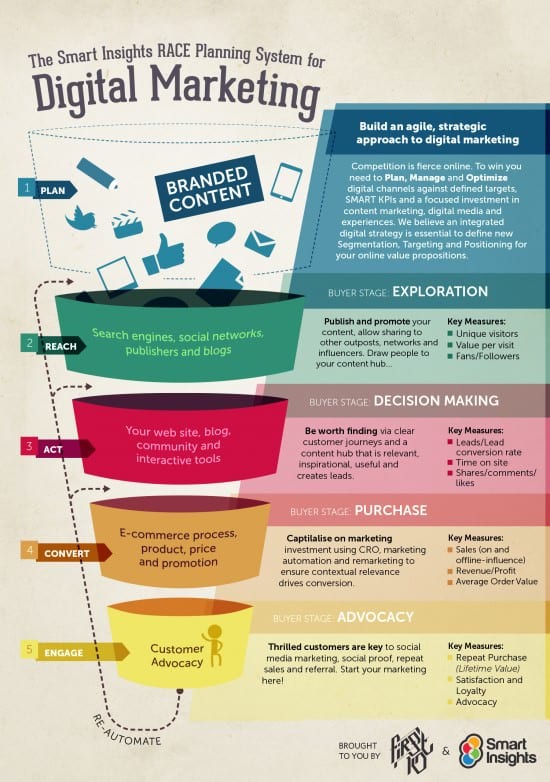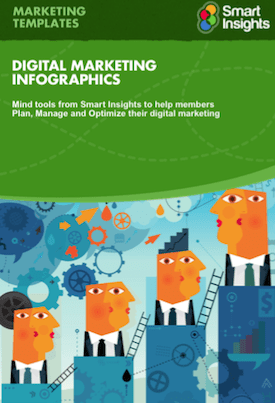Using the Smart Insights RACE marketing funnel to develop a Digital Strategy
As we enter 2015, the latest stats on use of digital media and technology all point to the growing importance of creating a digital strategy. Did you know that
- During 2015 the number of global Internet users will pass 3 billion (Source: ITU)
- 80% of Internet users now own a smartphone (Source: Global Web Index survey of 32 major markets)
- Search remains the main traffic driver for websites (Source: Global Web Index)
The need for businesses to compete to reach and engage their audiences as they use digital devices is clear and well-established.
Yet we know from our Managing Digital Marketing research for 2014 and 2015 that many businesses don't have a digital strategy - only around half of all businesses are using digital media and technology strategically.
Using the RACE system for Digital Strategy development
To help businesses create or refine their digital strategy, Dan Bosomworth and I created the RACE planning framework to summarise key activities that need to be measured. This infographic gives a brief explanation of each part of the customer lifecycle and highlights the Key Performance Indicators (KPIs) to help review strategy effectiveness.
For 2015 we have updated our RACE digital strategy infographic to give a stronger focus on strategy development rather than inbound and content marketing which was more the focus of the original from 2012. I've also tightened up some of the KPIs so they cover the full range of VQVC measures.

We developed our RACE Digital Strategy framework to help businesses scope out their investment in digital technology and media. RACE is structured around the classic stages of customer lifecycle marketing from generating initial awareness in a brand as part of customer acquisition through nurturing relationships with prospects to sale and ongoing customer engagement.
It's one of 10 infographics which are designed to be useful - to help businesses map, plan and manage their digital strategy.

Recommended Download:
Free digital strategy infographic bundle
Members can download a PDF featuring all ten digital planning infographics.
If you're not familiar with RACE, these are the four main stages of the customer lifecycle and how a digital strategy and different forms of technology can support businesses to improve the efficiency of the funnel.
- Reach - Technology for managing inbound marketing and key techniques like search and social media marketing
- Act (short for Interact) - Technology for managing content marketing and lead generation
- Convert - Marketing automation technology for managing lead conversion to sale and ecommerce management
- Engage - Marketing automation and customer service technology for digital media engagement
The marketing funnel remains as the most common way to manage customer engagement and to set targets and review performance. Although most would agree that prospects don't pass through the funnel in a linear way and it's more of iterative process as shown in this infographic summarising the customer buying decision, it's essential that a funnel-based conversion model is use to set targets and review the effectiveness and efficiency of online marketing.
What is a digital strategy?
A digital strategy defines a focus for investment in digital technology and media for an organisation to engage audiences as they use digital devices.
The growth in use of digital devices by consumers as they select and buy products has changed consumer buying behaviour to such a degree that a digital strategy is now seen as essential by many.
How does a digital strategy differ from a digital marketing strategy?
A digital strategy and digital marketing strategy are very similar, so it's not worth getting too hung up on the terminology or differences, however they can mean different things to different people within an organisation, so it's best to standardise. Otentimes, I find they are simply different labels with digital strategy a short-hand contraction for the longer digital marketing strategy. The digital strategy label may work better in some types of organisation. In government, or some not-for-profit organisations, developing a "digital marketing strategy" is less appropriate, so a digital strategy gives a more appropriate label for managing digital technologies. For example, the UK government defines its Digital Strategy in this useful way - here there is a clear focus on technology to deliver services rather than marketing.
So, alternatively, a digital strategy focuses on making the right investments in digital technology rather than digital media. Digital technology investments have both an internal and external perspective. From an internal point-of-view, digital strategy considers the range of digital technology deployed inside a company to manage digital marketing and digital business such as marketing automation, content and commerce management and CRM systems as catalogued so well by Scott Brinkler in his Marketing Technology Landscape From an external perspective, a digital strategy focuses more on digital technology used by audiences and considers how to engage audiences when using different types of digital devices from the obvious smartphone, tablets and desktop devices to the less obvious games consoles and in-store devices. The latest consumer usage stats now









